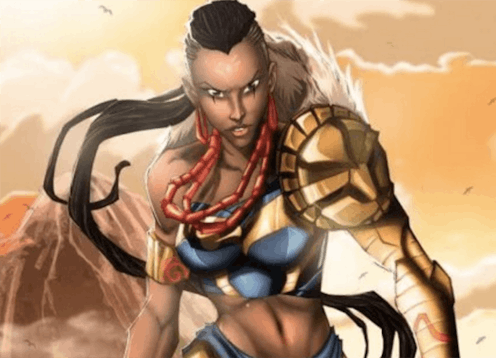Entertainment
Diversity In U.S Comics Needs To Step Up Its Game

In a move that probably should have been done 20 years ago, a comic book company in Lagos, Nigeria is creating the first-ever comic universe with African characters. Comic Republic, the heroes of the day, are a nine-person startup founded in 2013. Besides these comics, the company has also been commissioned to create comics for various companies' products, and NGOs have asked for help illustrating public health risks like malaria. But the comics are the really interesting part: characters such as Guardian Prime, a Superman-esque character who works as a fashion designer by day, champion of Nigeria by night, and Aje, a witch who is struggling to control her powers and use them for good and not evil, work together to protect their country. While all of this is well and good, and I send many blessings and congratulations to Comic Republic for being such go-getters and game-changers, I still find myself a little disappointed.
Not in these guys, of course. What they are doing is undoubtedly amazing and is a part of a much-needed Renaissance of African storytelling. I'm disappointed in the U.S. We have some of the most recognizable comic book companies in the world, and where are our African-American heroes? When you compare this startup, which is rocking diversity, to America's multiple comic universes with billion dollar budgets, which are doing, well, the opposite of rocking diversity, the results are very dire.
First, let's talk characters with interesting diversity. The Comic Republic series takes place in Nigeria, and thus the characters are all African. However, that doesn't stop them having from diverse backgrounds. Take Aje and Guardian Prime for example; everything from their ethnicities to their careers to their lives in the comics are geared toward representing a wide variety of people who might be downloading these comics and hoping to see themselves. And they aren't aren't one-dimensional or stereotypical characters, but, instead, fully-sketched people acting as a reflection of the diverse world in which they live. And then, as an American, I look at characters like Spiderman, who is from Queens (a place where 48 percent of the residents are foreign-born) and yet still manages to be a Caucasian-American character in all the movies and reboots. Or at all the superhero millionaires: I'm looking at you Bruce Wayne and Tony Stark. Where are the stories of America's tired, hungry, poor huddled masses being superheroes? I know there are a few in various comic books, but they aren't the ones with the multi-million dollar franchises, and very few of them are headlining their own comic titles.
Comic Republic also wins points because of the outstanding number of female characters. Of the nine characters, four of them are ladies. It's incredibly refreshing to have a group of superheroes that have more than one woman, and a woman who isn't just a love interest for one of the male heroes. Sure, Marvel has pulled out some female-led franchises recently with Agent Carter and Jessica Jones, but where is my Black Widow movie? Or a Catwoman movie that isn't just incredibly sexualized? The female characters from Comic Republic are fascinating; one example of this is Bidemi Ogunde, an archeology student and gymnast at the University of Ibadan. She gets her powers when attacked by a scourge at a national museum. She isn't defined by her sexuality; instead, she is defined by her desire to create a better Africa. Are you listening, America?
It cannot be said that minority characters don't have a following. So far, the Comic Republic comics, which are published online and are available for free download, have had a fast-growing fan base. The latest release last month scored 25,000 downloads alone. In the giant melting pot that is the U.S., where there are so many people from so many different backgrounds, countries, heritages, and life experiences, it shouldn't be an ongoing battle to get comics to devote series and franchises to showcasing minority characters. It is insane to me that a small start-up is able to create such diverse content, while huge American companies that have been selling comics and crafting characters for public consumption for years aren't making it a priority in every issue to avoid creating heroes that fit the same old mold.
As Dan Didio, a co-publisher of DC Entertainment claims, "[lack of diversity] is something we've been aware of for a while, and we've made some great steps along the way to improve diversity in our product... I can't speak for other companies, I can only speak for myself but I think there's a level of awareness and a level of urgency that we all realize that we have to be really reflective of these times." But, as the work of Comic Republic proves, it's time for American companies to bring their A-game. Didio believes that a more diversified audience will only expand once more characters with diverse backgrounds begin to come out, and, honestly, diversity in comic industries makes good business sense. There are so many people in America of different backgrounds; can you imagine how profitable it would be to give them representation in the comics they already love?
With a tagline like "We Can All Be Heroes," Comic Republic is working to inspire the masses in Nigeria and abroad. American comic book companies and movie franchises, where's my inspiration? I'm tired of looking for a hero that looks like me, or, at least, a hero that isn't a blond-haired blue-eyed All-American with an insanely small waist and hips and a 9 to 5. Americans are all shapes, sizes, and colors with all sorts of skill sets. It's time our comic book universes represented that diversity, so that their audience doesn't have to look to other countries for the representation they deserve.
Images: Comic Republic (3)